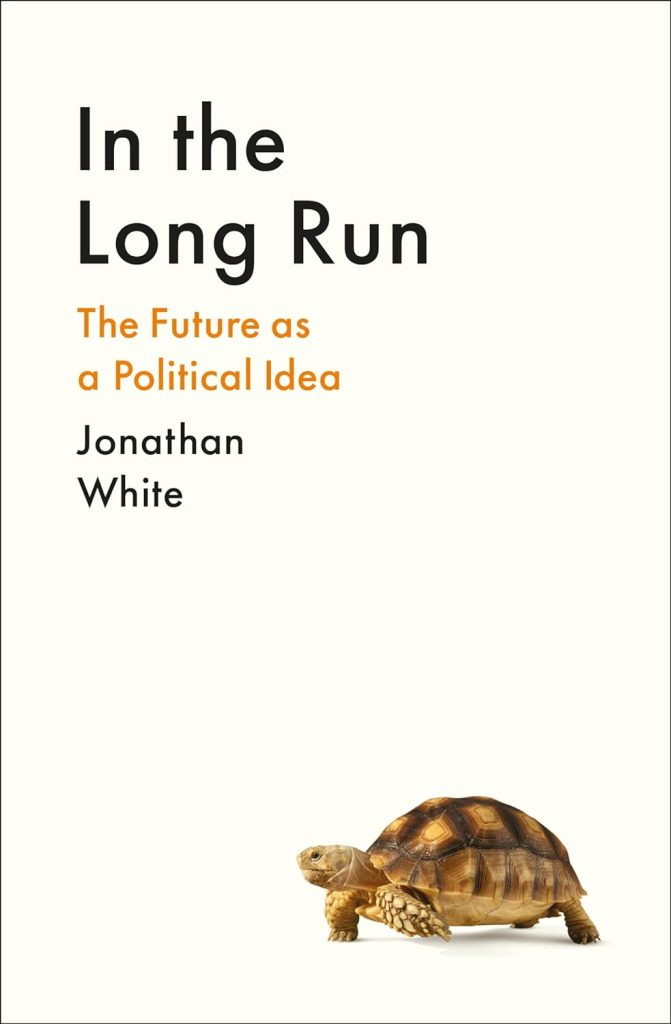 Jonathan White‘s In the Long Run: The Future as a Political Idea examines how changing political conceptions of the future have impacted democracy, arguing that contemporary challenges like economic slowdown and climate change have led to reactive politics and short-termism. Though the book proposes ways to revitalise democracy, Aveek Bhattacharya suggests we may need to seek beyond our political institutions for strategies to build a more open future.
Jonathan White‘s In the Long Run: The Future as a Political Idea examines how changing political conceptions of the future have impacted democracy, arguing that contemporary challenges like economic slowdown and climate change have led to reactive politics and short-termism. Though the book proposes ways to revitalise democracy, Aveek Bhattacharya suggests we may need to seek beyond our political institutions for strategies to build a more open future.
You can read an interview with Jonathan White about the book here. On Monday 11 March at 6.30pm White will speak at an LSE panel event, The politics of the future – find details and register here.
In the Long Run: The Future as a Political Idea. Jonathan White. Profile Books. 2024.
 In the Long Run: The Future as a Political Idea is a book about the history of the future, and what it means for the present. More precisely, it describes how the way people think about the future has evolved over time, and the impact of these changes on democracy. Jonathan White’s central argument is that while optimism for the future once helped build democracy, economic slowdown, climate change, new technology and geopolitical tension mean that “the future no longer seems its [democracy’s] friend”.
In the Long Run: The Future as a Political Idea is a book about the history of the future, and what it means for the present. More precisely, it describes how the way people think about the future has evolved over time, and the impact of these changes on democracy. Jonathan White’s central argument is that while optimism for the future once helped build democracy, economic slowdown, climate change, new technology and geopolitical tension mean that “the future no longer seems its [democracy’s] friend”.
For democracy to function, White observes, it is critical that people believe an “open future” is possible: that there are alternatives to the status quo, that society can evolve in a range of different ways, and that the people can choose between them. One of the key defining characteristics of democracy – the peaceful handover of power – is premised on changeability of the future: election losers believe that they will get their chance to achieve their vision of society again.
For democracy to function, White observes, it is critical that people believe an ‘open future’ is possible
In the present, White says, it is harder to maintain that patience and faith. The future is regarded with fear and claustrophobia. At various points he describes the future, far from being open, as “closing in”. Catastrophe – societal decay, conflict, environmental collapse – feels hard to avert. Insofar as there are options, they involve deferring to technocrats. There is a “now or never” urgency about politics, and a fear that waiting your turn means leaving it too late because the other side will destroy everything.
Via a tour of historical political thinkers, White sketches the ideas of the future that make for the most vibrant democratic system. Political and social outcomes must seem open, but not in such a destabilising manner as to trigger counter-revolution from those attached to the present. A strand of utopianism can be energising but must be linked to near-term political tactics to be practicable. Efforts to limit uncertainty, to render the future predictable, through calculation and technocracy risk squeezing out the necessary imagination and mass participation of vibrant democracy. At the same time, chaotic impulsiveness and pure disregard for expertise risks descending into fascism. Trying to control the future by keeping it secret is likely to generate conspiracy theories and discontent. Consumerism individualises the future and means we no longer share in it – we move from valorising Victorian steam trains to wanting our own personal cars.
Our perpetual state of emergency, while creating unpredictability, produces reactive politics, designed mainly to return things to the way they were.
The conception of the future we have arrived at today is not, in White’s opinion, sufficiently conducive to democracy. Our perpetual state of emergency, while creating unpredictability, produces reactive politics, designed mainly to return things to the way they were. Short-termism dominates – most notably, through the election cycle, but even longer-term threats like climate change are tractable only by converting them to benchmarks and deadlines. Managerialism and secrecy dominate, empowering organisations like the European Central Bank and the International Monetary Fund and triggering impulsive populist backlashes.
White’s proposals for rebuilding a more positive conception of the future and revitalising democracy are somewhat surprising. He is sceptical of direct democracy – while more referendums might give ordinary citizens more chance to shape the future, they raise the stakes and perpetuate the “all-or-nothing” politics he thinks is so baleful. Small-scale councils are too small-scale to create significant change, citizens’ assemblies too short-lived to pursue a persistent vision.
White calls for ‘radical representative democracy’, with mass participation in the development of party policy and party members having greater opportunity to recall politicians who fail to deliver on those agreed goals.
Instead, he puts his chips on political parties as the crucibles of a more inclusive, compelling and hopeful vision of the future. He calls for “radical representative democracy”, with mass participation in the development of party policy and party members having greater opportunity to recall politicians who fail to deliver on those agreed goals. It’s an argument with echoes of Peter Mair’s Ruling the Void, which also claimed that the disengagement of ordinary members and politicians from their political parties had led to “the hollowing of Western democracy”.
White’s rebooted party system sounds good in theory, but invites scepticism about its practicality. His central assumption is that citizens’ disempowerment is the root cause of our current democratic malaise, and that the opportunity for greater influence will suffice to tempt enough people to give up their evenings and weekends to political causes. It is not encouraging that the existing parties that have done most to engage with mass movements and improve participation with things like online platforms – Podemos in Spain and the Five Star Movement in Italy – do not seem to have restored democratic confidence in their countries.
The Victorian capitalists who built the factories and railroads may not have been personally attractive, but they inspired progressives and socialists to dream about how their innovations could be used to benefit all.
White is oddly dismissive of the pockets of optimism that do exist outside the political system – most notably Silicon Valley, where ideas like “Effective accelerationism”, the view that technological progress is likely to obviate many of our deepest societal challenges, has taken root. For White, they display the wrong sort of optimism: too consumerist and individualistic, too inclined towards anti-system chaotic thinking, tendencies encapsulated in the figure of Elon Musk, presented as fascistoid, if not fascist. Setting aside whether that is a fair characterisation of Musk, the question it raises is why the confidence of tech companies seems so divorced from the sentiments of wider society. The Victorian capitalists who built the factories and railroads may not have been personally attractive, but they inspired progressives and socialists to dream about how their innovations could be used to benefit all. There are some – figures like Aaron Bastani on the far left and Derek Thompson on the centre left – that are trying to do something similar today, but White does not recognise them as such.
White assumes that the problems of democracy are endogenous: that they are caused by political institutions and must be resolved by them.
Most fundamentally, White assumes that the problems of democracy are endogenous: that they are caused by political institutions and must be resolved by them. But there are more straightforward explanations for the modern morosity. Stagnant economic growth, and the failure of new technologies to demonstrably improve living standards, would naturally be expected to undermine confidence that things will improve. The demographic shift to an older population in rich countries may also have contributed to a lack of vitality and enthusiasm, and a tendency to look back with nostalgia rather than forward with hope. Even among the young, we should not necessarily take perceptions at face value. Phenomena like “climate anxiety” seem to reflect anxiety at least as much as they reflect the climate, and as such will often be psychological, not just political in nature.
That’s not necessarily a comforting thought. Maybe technological abundance is around the corner, maybe the economy will turn around, maybe the mental health crisis will abate – whether by sheer luck or unusually effective action – and people will start to feel better about the future. But In the Long Run suggests that fixing democracy’s problems, renewing our faith in the open future, is a much bigger task than tweaking its institutions.
- This review first appeared at LSE Review of Books.
- Image credit: Ryan Rodrick Beiler on Shutterstock
- Please read our comments policy before commenting.
- Note: This article gives the views of the reviewer, and not the position of USAPP – American Politics and Policy, nor of the London School of Economics.
- Shortened URL for this post: https://wp.me/p3I2YF-dDD






